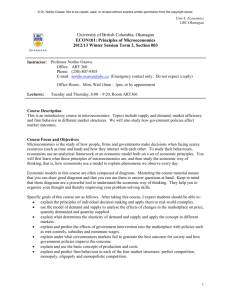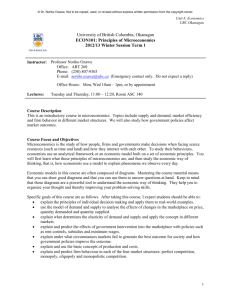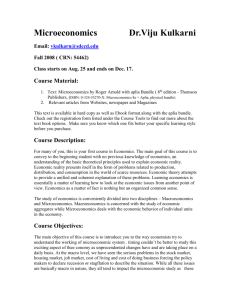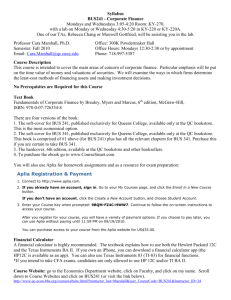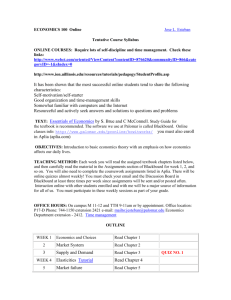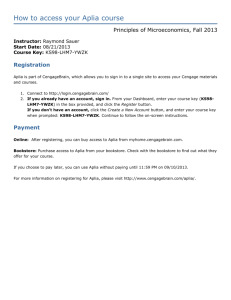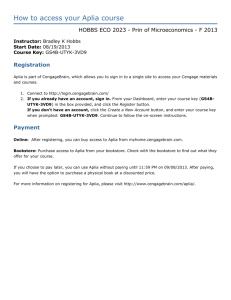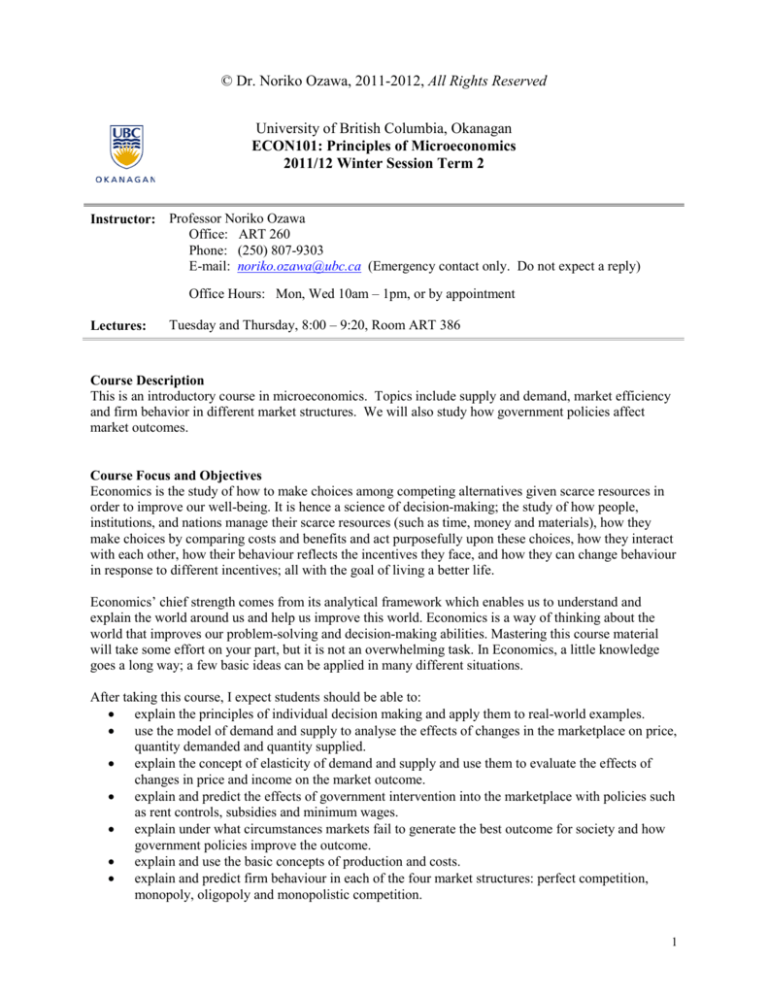
© Dr. Noriko Ozawa, 2011-2012, All Rights Reserved
University of British Columbia, Okanagan
ECON101: Principles of Microeconomics
2011/12 Winter Session Term 2
Instructor: Professor Noriko Ozawa
Office: ART 260
Phone: (250) 807-9303
E-mail: noriko.ozawa@ubc.ca (Emergency contact only. Do not expect a reply)
Office Hours: Mon, Wed 10am – 1pm, or by appointment
Lectures:
Tuesday and Thursday, 8:00 – 9:20, Room ART 386
Course Description
This is an introductory course in microeconomics. Topics include supply and demand, market efficiency
and firm behavior in different market structures. We will also study how government policies affect
market outcomes.
Course Focus and Objectives
Economics is the study of how to make choices among competing alternatives given scarce resources in
order to improve our well-being. It is hence a science of decision-making; the study of how people,
institutions, and nations manage their scarce resources (such as time, money and materials), how they
make choices by comparing costs and benefits and act purposefully upon these choices, how they interact
with each other, how their behaviour reflects the incentives they face, and how they can change behaviour
in response to different incentives; all with the goal of living a better life.
Economics’ chief strength comes from its analytical framework which enables us to understand and
explain the world around us and help us improve this world. Economics is a way of thinking about the
world that improves our problem-solving and decision-making abilities. Mastering this course material
will take some effort on your part, but it is not an overwhelming task. In Economics, a little knowledge
goes a long way; a few basic ideas can be applied in many different situations.
After taking this course, I expect students should be able to:
• explain the principles of individual decision making and apply them to real-world examples.
• use the model of demand and supply to analyse the effects of changes in the marketplace on price,
quantity demanded and quantity supplied.
• explain the concept of elasticity of demand and supply and use them to evaluate the effects of
changes in price and income on the market outcome.
• explain and predict the effects of government intervention into the marketplace with policies such
as rent controls, subsidies and minimum wages.
• explain under what circumstances markets fail to generate the best outcome for society and how
government policies improve the outcome.
• explain and use the basic concepts of production and costs.
• explain and predict firm behaviour in each of the four market structures: perfect competition,
monopoly, oligopoly and monopolistic competition.
1
© Dr. Noriko Ozawa, 2011-2012, All Rights Reserved
Required Course Materials
1.
2.
Aplia access card
N. Gregory Mankiw et al., Principles of Microeconomics (5th Canadian Edition), Nelson,
Thomson Canada 2011.
Aplia is an internet-based learning tool. Aplia access card gives you access to a digital version of the
textbook and online homework assignments for the duration of this course. You can purchase either
Aplia access card with or without a hard copy of the textbook (See the last page of syllabus for detail).
Course Requirements and Evaluation
Your final grade of the course will be based on the following components:
Aplia On-line Assignments:
Quizzes on Mankiw’s chapters
News Analysis
Midterm Test 1
Midterm Test 2
Final Exam
15% (Throughout the course)
5% (Throughout the course)
20% (Tuesday, January 31)
20% (Tuesday, March 13)
40%
The 60-minute midterm test will be held in class on Tuesday, January 31 and on Tuesday, March 13. The
3-hour final examination, worth 40% of the grade, will be held during the April examination period (Apr.
11 – 25 inclusive).
No make-up midterm test will be given under any circumstances. If you miss the midterm test for a valid
medical or personal reason, with the validity as assessed by the instructor, then the weight of that test will
be placed on the final exam.
Aplia On-line Assignments: On the webpage of this course at Aplia website, you will find two
types of graded assignments, Chapter Quiz and News Analysis. Chapter Quiz tests your
understanding of the materials covered in a specific chapter of the text. News Analysis asks you
first to read a newspaper article and then to answer questions related to the article. It tests your
ability to apply the economic principles learned in the chapter to real world events.
Both Chapter Quiz and New Analysis that correspond to the chapters covered in class in a given
week are due at 11pm, the following Monday. For example, if I cover chapter 4 in week 4, Ch. 4
Quiz and News Analysis about used textbooks will be due at 11pm, Monday in week 5 (i.e., Jan.
30). For a given Monday, the number of assignments may be as little as 1, or as many as 6. Plan
ahead, start early and don’t wait until the last minute. No credit will be given for assignments
submitted after the deadline. If you have any questions or concern about the grading of an Aplia
assignment, you must inform me within one week of the due date for re-evaluation.
How to Compute Your Marks on Aplia Assignments
1. Chapter Quizzes
There will be a total of 17 Chapter Quizzes. Some quizzes have more questions than others.
Your score of each quiz is the proportion of correct answers. To determine your mark on the
Aplia quizzes, I first drop two quizzes with your lowest scores and then compute the average
2
© Dr. Noriko Ozawa, 2011-2012, All Rights Reserved
of your scores on the remaining 15 quizzes. Your average mark on Chapter Quizzes counts
15% of your course grade.
2.
News Analysis Assignments
There will be a total of 18 News Analysis assignments. Of those, you are required to
complete 10 assignments. Your final mark on News Analysis Quizzes is the average of your
scores on the 10 assignments you submitted. If you submit more than 10, then I will use
your top 10 scores to compute the average. Your average score on News Analysis
assignments counts 5% of your course grade.
Course Websites
1.
WebCT Vista
I will use WebCT Vista to distribute lecture notes, review questions (for the midterms and the final
exam) and their solutions, and the links to the websites listed below. You can also check your
marks of the midterms on this website.
Lectures are most often PowerPoint presentation. I will post my lecture notes on WebCT Vista one
day before I discuss in class (e.g., by 5pm Monday for Tuesday’s lecture). The lecture notes
contain key concepts, their definitions and descriptions of models. Most of your note taking are
drawing diagrams and/or solving math problems. I recommend that you print the lecture notes and
bring them to the class. You can then take your own notes and/or draw diagrams directly on
the print outs.
2.
Aplia (http://www.aplia.com)
You will go to this website to do homework assignments and/or do required readings.
3.
Mankiw Textbook Support Site: (http://www.mankiw5e.nelson.com)
Classroom Etiquette
Please respect your fellow students and the instructor by doing only class-related activities inside the
classroom. Please turn your cell phones, text messages, etc. off and refrain from non class-related
activities.
Laptop Usage: I discourage you from using your laptop in class because it will become distraction
to other students. If you must use it, please seat back of the room and turn the sound off.
3
© Dr. Noriko Ozawa, 2011-2012, All Rights Reserved
Tentative Lecture Schedule and Reading Assignments
Dates
Week 1
Topic
Principles of Economics
Assigned Reading
Ch. 1
Week 2
Thinking Like an Economist
Interdependence and Gains from Trade
Ch. 2
Ch. 3
Week 3
Market Forces of Supply and Demand
Ch. 4
Week 4
Elasticity and Its Application
Supply, Demand and Government Policies
Ch. 5
Ch. 6
Week 5
Term Test 1 (Tuesday, Jan. 31)
Consumers, Producers and the Efficiency of Markets
Ch. 7
Week 6
The Costs of Taxation
International Trade
Ch. 8
Ch. 9
Week 7
Externalities
Ch. 10
Week 8
Reading Week (No class)
Week 9
Public Goods and Common Resources
The Design of the Tax System
Ch. 11
Ch. 12
Week 10
Term Test 2 (Tuesday, Mar. 13)
The Costs of Production
Ch. 13
Week 11
Firms in Competitive Markets
Ch. 14
Week 12
Monopoly
Ch. 15
Week 13
Monopolistic Competition
Oligopoly
Ch. 16
Ch. 17
Week 14
Review for the final exam
4
© Dr. Noriko Ozawa, 2011-2012, All Rights Reserved
Academic Integrity
The academic enterprise is founded on honesty, civility and integrity. As members of this enterprise, all
students are expected to know, understand, and follow the codes of conduct regarding academic integrity.
At the most basic level, this means submitting only original work done by you and acknowledging all
sources of information or ideas and attributing them to others as required. This also means you should
not cheat, copy, or mislead others about what is your work. Violations of academic integrity (i.e.,
misconduct) lead to the breakdown of the academic enterprise, and therefore serious consequences arise
and harsh sanctions are imposed. For example, incidences of plagiarism or cheating usually result in a
failing grade or mark of zero on the assignment or in the course. Careful records are kept in order to
monitor and prevent recidivism.
A more detailed description of academic integrity, including the policies and procedures, may be found
at: http://web.ubc.ca/okanagan/faculties/resources/academicintegrity.html.
Disability Resources
If you require disability related accommodations to meet the course objectives, please contact the
Coordinator of Disability Resources located in the Student Development and Advising area of the student
services building. For more information about Disability Resources or about academic accommodations
please visit the website at: http://www.okanagan.students.ubc.ca/current/disres.cfm.
Equity, Human Rights, Discrimination and Harassment
UBC Okanagan is a place where every student, staff and faculty member should be able to study and
work in an environment that isfree from human rights based discrimination and harassment.If you require
assistance related to an issue of equity, discrimination or harassment, please contact the Equity Office,
your administrative head of unit, and/or your unit’s equity representative.
UBC Okanagan Equity Advisor: ph. 250-807-9291; email equity.ubco@ubc.ca
Web: www.ubc.ca/okanagan/equity
Unit Equity
Representatives:http://www.ubc.ca/okanagan/equity/programs/equityreps/unitcontacts.html
5
© Dr. Noriko Ozawa, 2011-2012, All Rights Reserved
How to access your Aplia course
Course Name: ECON101: Principles of Microeconomics, 2011W Term 2
Instructor: Noriko Ozawa
Start Date: 01/03/2012
Course Key: ZPPS-QA93-CTVM
You can begin working on your homework as soon as you register!
• In this course, you will use a textbook and Aplia's website.
• You will have access to a digital version of your textbook on Aplia through the end of this
course.
• If you wish to have a hardcopy of your textbook, you can save money if you buy the course
package at the UBCO bookstore. See payment options below.
Registration
1. Connect to http://login.nelsonbrain.com.
2. If you already have an account, sign in. From your Dashboard, enter your course key (ZPPS-QA93CTVM) in the box provided, and click the Register button.
If you don't have an account, click the Create an Account button, and enter your course key when
prompted: ZPPS-QA93-CTVM. Continue to follow the on-screen instructions.
Purchase Options
The UBCO bookstore offers you two options.
Option 1: Buy Aplia access card alone online at the price of $80.00.
• Aplia access card gives you access to your on-line assignments and the subscription of digital
copy of the text for the duration of this course.
Option 2: Buy the course package at the price of $145. (Recommended)
• The package includes Aplia access card, a hard copy of the text and the study guide.
6


